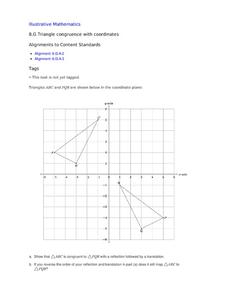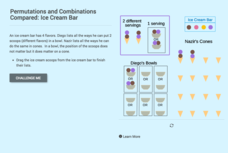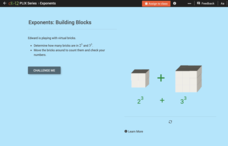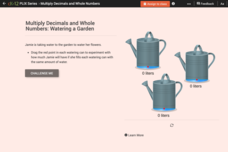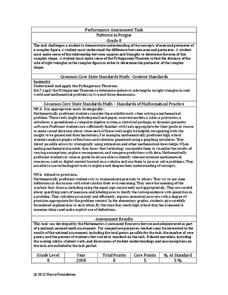CK-12 Foundation
Proportions to Find Percents: Bag of Candy
Proportions and percents are the focus of an interactive designed to boost math proficiency. Five questions challenge participants to solve candy-themed word problems. A color-coded tool with moveable parts assists mathematicians in the...
Curated OER
Triangle Congruence with Coordinate
Two triangles are displayed on a coordinate plane. Youngsters apply a reflection and a translation to demonstrate their congruence. This exercise makes a terrific tool for teaching these concepts, or a way to assess learning.
CK-12 Foundation
Rectangular to Polar Form for Equations: Polar Coordinates
Plot points around a wheel. Pupils use an interactive tool to plot a point using polar coordinates with the aid of a wheel. Scholars use the interactive to answer five questions to finish the lesson. The resource provides background...
CK-12 Foundation
Rotations in Radians: Clock Conundrum
Pupils use an interactive clock to set specific times. They apply math to an everyday task as they determine the measure of the angle formed by the hands in degrees and in radians.
CK-12 Foundation
Law of Cosines: Get on Base
Baseball is all about math. Young baseball and mathematics enthusiasts determine the distance between players on a baseball field using the Law of Cosines. An interactive helps them find relevant distances and angles to use in their...
CK-12 Foundation
Possible Triangles with Side-Side-Angle
It's not often that math allows for multiple answers. Young mathematicians identify possible numbers of triangles when given two sides and a non-included angle. An interactive helps with this investigation.
CK-12 Foundation
Measurement of Probability
Stockings make your legs warmer and math more enjoyable. A drag-and-drop interactive has pupils take stockings out of drawers to calculate probabilities. This includes dependent events where the probabilities depend on previous stocking...
CK-12 Foundation
Graphs Using Slope-Intercept Form: Zip-Line
Zip lines aren't so scary when all your scholars use them for is math. Young mathematicians see how the slope of a zip-line to a building changes as the height changes. They answer a set of challenge questions regarding the scenario.
CK-12 Foundation
Permutations and Combinations Compared: Ice Cream Bar
Learning math from an ice cream shop—what a tasty treat! Individuals use an interactive to list all possibilities for a double-scoop ice cream. Along the way, they learn to distinguish between permutations and computations.
CK-12 Foundation
Bisectors of Line Segments and Angles: Cut a Line
Geometric constructions build relationships —by simply manipulating simple tools. An interactive lesson presents a completed construction of a segment bisector and has learners analyze the important aspects. Ultimately, they should be...
CK-12 Foundation
Line Graphs to Display Data Over Time: Strawberry Competition
Take the tediousness out of graphing. Using the interactive tool, learners can efficiently create a line graph from a set of data. They then use the graph to answer questions about specific trends in the data.
CK-12 Foundation
Whole Number Exponents: Building Blocks
Five questions make up an interactive all about whole-number exponents. Movable building blocks create a visual tool to aide mathematicians in answering multiple-choice and true or false problems. The interactive ends with a discussion...
CK-12 Foundation
Repeating Decimals: Does 1 equal 0.999... ?
Six questions make up a challenging interactive that tests scholars' knowledge of repeating decimals. Mathematicians answer true or false and multiple-choice questions with help from a tool that highlights decimal movement in an...
CK-12 Foundation
Estimation to Check Decimal Multiplication: Watering a Garden
Mathematicians solve six multiple-choice and true or false questions using their knowledge of estimation and multiplying decimals. The interactive provides a garden-themed tool that creates a visual aid of three watering cans to assist...
Intel
Choreographing Math
Leaners investigate families of linear functions through dance. They choreograph dance moves to model nine unique linear functions of their choosing. Using their dance moves, teams create a video presentation complete with music and...
DECA
Sample Exam: Personal Financial Literacy
Looking for a way to assess pupils' personal financial literacy? A 100-question, multiple-choice exam provides a good understanding of what class members already know and need to know about personal finance.
Curated OER
Introduction to Flight: A Math, Science and Technology Integrated Project
Seventh graders review graphing procedures and practice locating points using x,y coordinates. Students calculate the areas of the top and bottom surfaces of the airfoil. They construct a test model of the airfoil.
Math Worksheets 4 Kids
Percent, Fraction, and Decimal
This is a great tool for practicing/reinforcing conversion of percents, fractions, and decimals.
Curated OER
Measure the Length of an Object
Every measuring job requires a tool, but which is the right one? Scholars read four measuring tasks and select the proper tool for each. Next, they switch the exercise by choosing from a list of measuring tasks given a tool. Note there...
Curated OER
Math Prefixes
Young scholars use a dictionary to gather appropriate information for writing simple definitions. They recognize prefixes that relate to numbers, such as mono-, bi-, and tri-. Pupils use their creative abilities to extrapolate new words...
MARS - Mathematics Assessment Resource Service
Applying Properties of Exponents
The properties of exponents are all linked together and it is your mathematicians' job to discover and apply those rules. The comprehensive instructional activity begins with a pre-assessment task to check for prior knowledge and then...
Noyce Foundation
Sewing
Sew up your unit on operations with decimals using this assessment task. Young mathematicians use given rules to determine the amount of fabric they need to sew a pair of pants. They must also fill in a partially complete bill for...
Inside Mathematics
Patterns in Prague
Designers in Prague are not diagonally challenged. The mini-assessment provides a complex pattern made from blocks. Individuals use the pattern to find the area and perimeter of the design. To find the perimeter, they use the Pythagorean...
Inside Mathematics
Rugs
The class braids irrational numbers, Pythagoras, and perimeter together. The mini-assessment requires scholars to use irrational numbers and the Pythagorean Theorem to find perimeters of rugs. The rugs are rectangular, triangular,...



